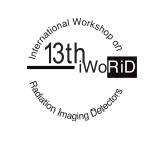Speaker
Mr
Soman Matthew
(Open University)
Description
The Super Advanced X-ray Emission Spectrometer (SAXES) [1] at the ADRESS beamline [2] of the Swiss Light Source (SLS) is a high-resolution X-ray spectrometer used as an end station for Resonant Inelastic X-ray Scattering at 400 to 1600 eV [1].
It disperses photons across a CCD, allowing the energy of scattered photons to be determined by the spatial position. The limiting factor of the energy resolution is currently the spatial resolution achieved with the CCD, reported at 24 μm FWHM [1].
Electron clouds are formed by interactions in the ‘field free’ region of the back-illuminated CCD. These clouds diffuse in all directions whilst being attracted to the electrodes, leading to events that are made up of signals in multiple pixels. This allows centroiding techniques to be used to improve the CCD spatial resolution and the energy resolution of SAXES.
The PolLux microscopy beamline at the SLS [3] produces an X-ray beam with a width of down to 20 nm. The images produced from scanning this beam across CCD pixels (~15 μm^2) can be applied to produce event recognition algorithms to match event profiles to photon interactions in a particular region of a pixel. This information can help improve the software analysis currently used at SAXES, improving the energy resolution.
[1] G. Ghiringhelli, et al., Rev. Sci. Instrum., vol. 77, 113108, 2006.
[2] V. N. Strocov, et al., J. Synchrotron Radiat., vol. 17, 631-643, 2010.
[3] J. Raabe, et al., Rev. Sci. Instrum., vol. 79, 113704, 2008.
Author
Mr
Soman Matthew
(Open University)
Co-authors
Prof.
Andrew Holland
(Open University)
Dr
Bernd Schmitt
(Paul Scherrer Institute)
Dr
David Hall
(Open University)
Mr
James Tutt
(Open University)
Dr
Joerg Raabe
(Paul Scherrer Institute)
Dr
Thorsten Schmitt
(Paul Scherrer Institute)
